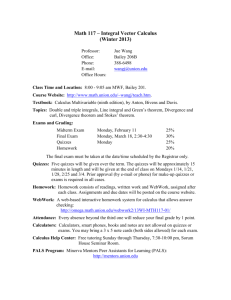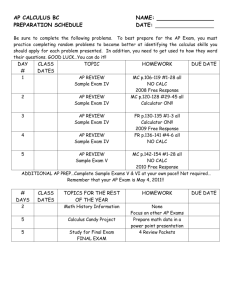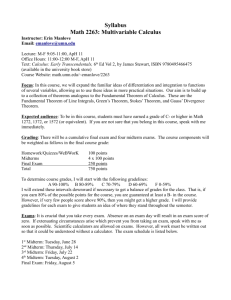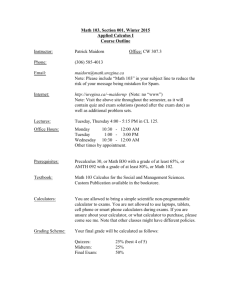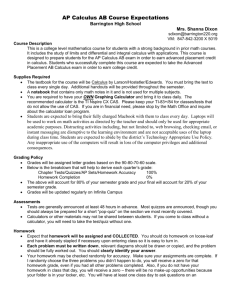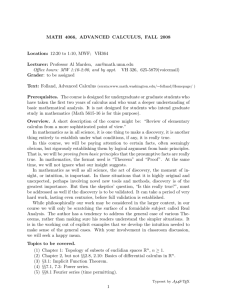Fall 2009
advertisement
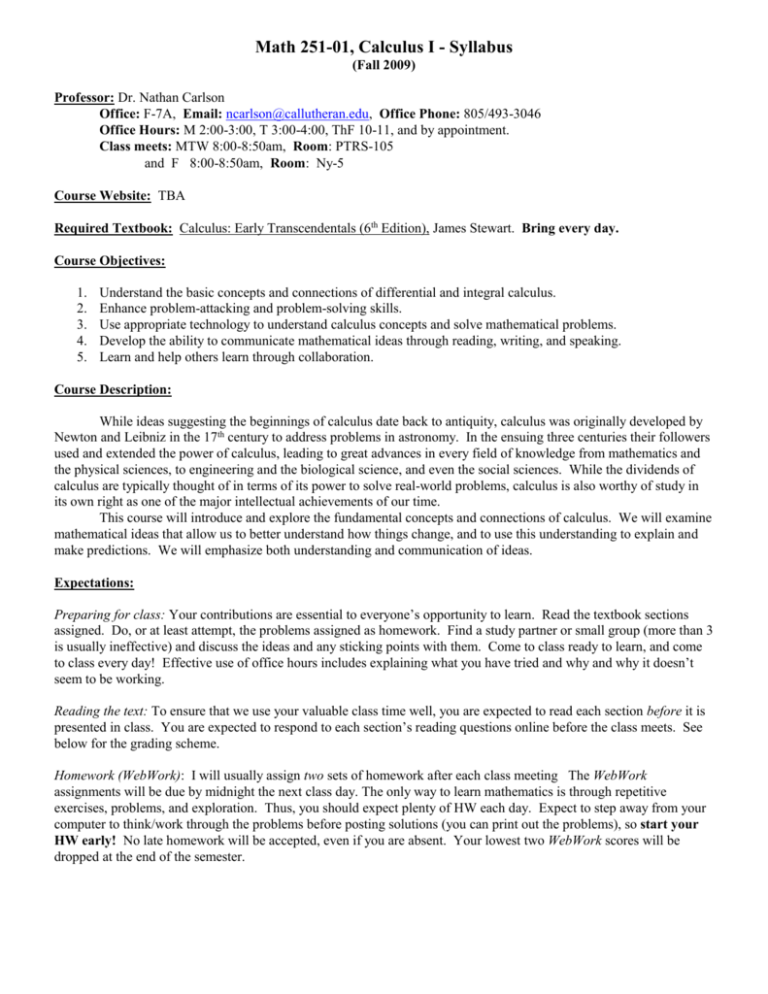
Math 251-01, Calculus I - Syllabus (Fall 2009) Professor: Dr. Nathan Carlson Office: F-7A, Email: ncarlson@callutheran.edu, Office Phone: 805/493-3046 Office Hours: M 2:00-3:00, T 3:00-4:00, ThF 10-11, and by appointment. Class meets: MTW 8:00-8:50am, Room: PTRS-105 and F 8:00-8:50am, Room: Ny-5 Course Website: TBA Required Textbook: Calculus: Early Transcendentals (6th Edition), James Stewart. Bring every day. Course Objectives: 1. 2. 3. 4. 5. Understand the basic concepts and connections of differential and integral calculus. Enhance problem-attacking and problem-solving skills. Use appropriate technology to understand calculus concepts and solve mathematical problems. Develop the ability to communicate mathematical ideas through reading, writing, and speaking. Learn and help others learn through collaboration. Course Description: While ideas suggesting the beginnings of calculus date back to antiquity, calculus was originally developed by Newton and Leibniz in the 17th century to address problems in astronomy. In the ensuing three centuries their followers used and extended the power of calculus, leading to great advances in every field of knowledge from mathematics and the physical sciences, to engineering and the biological science, and even the social sciences. While the dividends of calculus are typically thought of in terms of its power to solve real-world problems, calculus is also worthy of study in its own right as one of the major intellectual achievements of our time. This course will introduce and explore the fundamental concepts and connections of calculus. We will examine mathematical ideas that allow us to better understand how things change, and to use this understanding to explain and make predictions. We will emphasize both understanding and communication of ideas. Expectations: Preparing for class: Your contributions are essential to everyone’s opportunity to learn. Read the textbook sections assigned. Do, or at least attempt, the problems assigned as homework. Find a study partner or small group (more than 3 is usually ineffective) and discuss the ideas and any sticking points with them. Come to class ready to learn, and come to class every day! Effective use of office hours includes explaining what you have tried and why and why it doesn’t seem to be working. Reading the text: To ensure that we use your valuable class time well, you are expected to read each section before it is presented in class. You are expected to respond to each section’s reading questions online before the class meets. See below for the grading scheme. Homework (WebWork): I will usually assign two sets of homework after each class meeting The WebWork assignments will be due by midnight the next class day. The only way to learn mathematics is through repetitive exercises, problems, and exploration. Thus, you should expect plenty of HW each day. Expect to step away from your computer to think/work through the problems before posting solutions (you can print out the problems), so start your HW early! No late homework will be accepted, even if you are absent. Your lowest two WebWork scores will be dropped at the end of the semester. Math 251-01, Dr. Fogel, Spring 2009 Homework (Book work, Quizzes): In addition to the daily WebWork assignments, I will also assign problems from the book. You are expected to complete these problems and thoroughly understand their solutions. These HW problems will not be collected, but you will be quizzed on them most every Wednesday (see schedule). The quizzes will consist of a few questions taken straight from the book problems, though numbers may be changed within the problems. Quizzes will almost always occur during the first 10 minutes of class. Late arrivals will not be granted extra time. Your lowest two quiz scores will be dropped at the end of the semester. No make-up quizzes will be granted. Computer Labs: Labs are to be done in teams of two. I will assign partners for the first few labs and you may choose freely after that point. To each lab, bring your textbook and a flash drive (or a blank disk). No late labs will be accepted. Midterm Exams: We will have 3 midterm exams during the semester. We will discuss their content as they approach. Absolutely no make-up exams will be offered so put them on your calendar today. Each exam will be held during class on the following dates: Midterm 1: Friday, October 2; Midterm 2: Monday, November 2; Midterm 3: Monday, November 30 Final Exam: The cumulative final for this class is scheduled for Monday, December 14 from 8:00am-10:00am, as scheduled by the registrar. In an effort to be fair to all students, no one may take the final exam at any other time or date. Mark your calendars now!! Calculators: You may use a scientific calculator such as TI-36X or TI-30Xa. However, absolutely no graphing calculators are allowed. Do not bring a graphing calculator to the exams; you will not be allowed to use it. If you already own a calculator and are not sure if it is allowed in exams, ask the professor now (not on exam day). If you own a graphing calculator, you are strongly advised to put it away for the duration of the semester. By using a scientific calculator throughout the semester, you become better acquainted with it and increase your chances for success on exams. Cell phones may not be used (even as calculators or clocks) under any circumstances. Grading System: WebWork Homework (after dropping lowest two assignments) = 14% HW Quizzes (after dropping lowest two quizzes) = 14% Labs = 10% Midterm exams = 14% each (42% combined) Final exam = 14% Online reading questions = 6% Total = 100% At the end of the semester, your grade will be determined by your percentage as follows: A 100-93 C 78-73 A93-90 C73-70 B+ 90-88 D+ 70-68 B 88-83 D 68-63 B83-80 D63-60 C+ 80-78 F 60-0 Individual Effort and Collaboration: The faculty of CLU expects all students to adhere to the highest standards of academic honesty and to refrain from any action that infringes upon the academic freedom of other members of the academic community. For more general information on academic integrity, see your CLU Student Handbook. Accommodations for Students with Disabilities: CLU is committed to providing reasonable accommodations to students with various documented disabilities (physical, learning, or psychological). Any such student should contact the professor at the beginning of the semester and register with the Coordinator for Students with Disabilities (Pearson Library, Center for Academic Resources, x3260).

